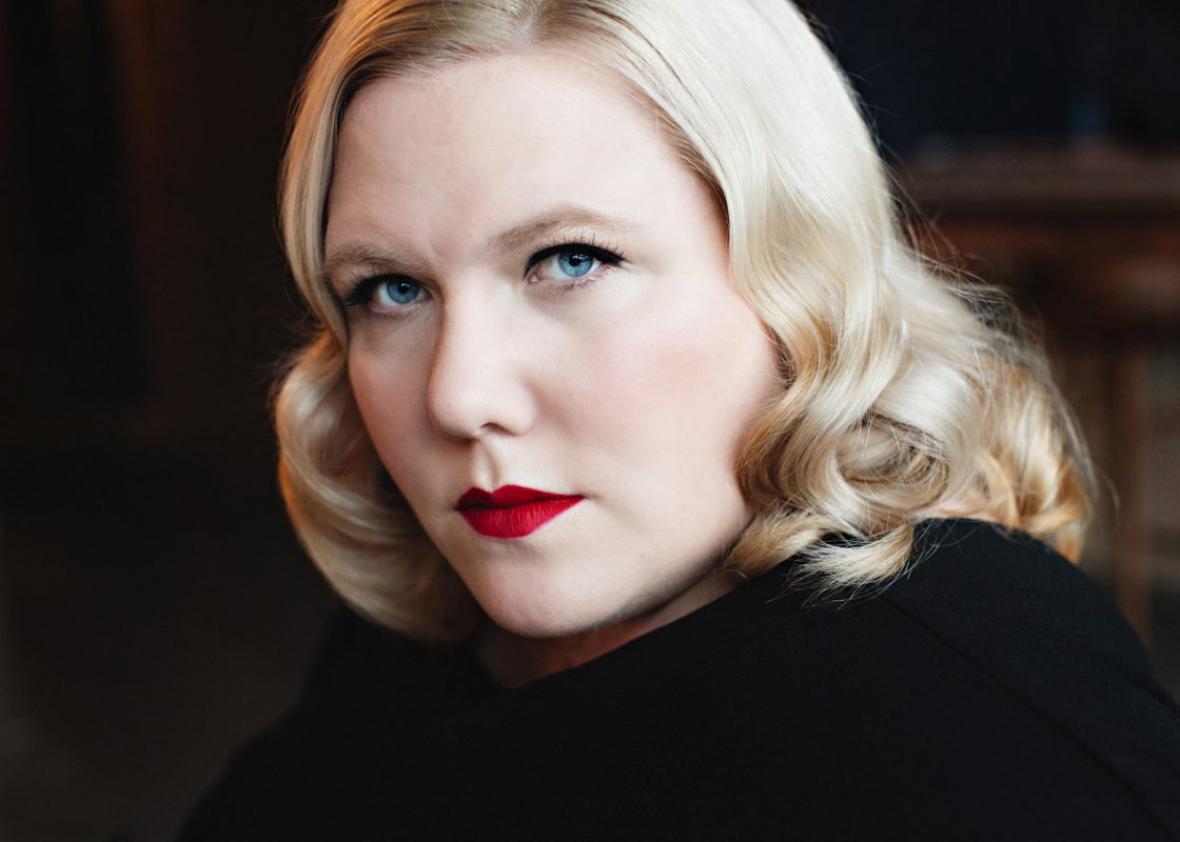There are many reasons a successful ladyblogger might want to scoop her voice from the river of the internet and distill it in the pages of a book. There’s the possibility that she will find a new and expanded audience, as Roxane Gay did with Bad Feminist. There’s the argument, which Sarah Mesle of the Los Angeles Review of Books made about Mallory Ortberg’s Texts From Jane Eyre, that the informality of bloggy writing suits the hierarchy-toppling project of feminism—and therefore that it deserves the careful consideration we give books. There’s the possibility that the ladyblogger simply has a self-contained and book-sized story to tell, as Jen Doll did in Save the Date, her saga of singlehood during wedding season.
The latest addition to this literary category is Shrill: Notes From a Loud Woman, by Guardian columnist and former Jezebel blogger Lindy West. Like many an internet sensation’s debut, this memoir-cum–call-to-arms pulls from previously published work and spins it into something new. The book is savvily positioned for both West neophytes and West diehards: It’s a primer on the development of her fat-accepting, feminist consciousness, told with adrenalized wit. (West describes how she sometimes deals with the hordes of misogynist trolls who menace her on Twitter by “toss[ing] the troll around for a while like a pod of orcas with a baby seal.”) Her book is both sharp-toothed and fluid as it rips into period stigma and abortion stigma, sexism and fat-shaming. Though the book’s many shrewd insights sometimes feel strung together in a way that’s less than artful, they are always a pleasure to read.
Parts of Shrill are new, such as West’s ingenious “complete list of fat female role models available in my youth.” (She includes a defense of Ursula from The Little Mermaid: “History is written by the victors, so forgive me if I don’t trust some P90X sea king’s smear campaign against the radical fatty in the next grotto.”) Parts are familiar, such as a chapter adapted from a powerful Guardian column about her wedding. To see so much of West’s writing in one place is to appreciate her range. She can eviscerate the status quo with raunchy humor—in her opening chapter, she upends the message girls receive that “periods are the best! and we must never speak of them” by declaring that getting hers felt like watching her vagina “transform into a chocolate fountain (SORRY) and turn my pants into a crime scene once a month.” She can attack entrenched sexism with skilled polemic, as when she argues for why “fat is a feminist issue.” And she can leave both of those modes behind to write poignantly about growing up, losing her father, and falling in love.
That’s a lot of ground to cover, and Shrill toggles between thematic and chronological modes of organization. In a book that falls somewhere between a single narrative and a collection of essays, this can be disorienting. An anecdote in which West is assigned by Seattle’s the Stranger to cover a “Red Tent Temple”—a place, inspired by Anita Diamant’s novel The Red Tent, where women congregate to celebrate their menstrual cycles—is wedged between stories from her childhood, apparently to consolidate the topic of menstrual embarrassment. Two of the book’s strongest chapters are somewhat awkwardly juxtaposed. In one, West wonders if her resilience in the face of trolling and misogyny is “a masochistic form of vanity—the vestigial allure of a rugged individualism that I don’t even believe in.” In the following chapter, a lyrical portrait of her parents’ marriage of opposites, she wonders if the grit she inherited from her mother and the idealism she got from her father made her “preternaturally suited” for withstanding trolls.
West is propulsively entertaining—more than enough to carry the reader through the book’s meanderings. Shrill is least engaging when West seems most concerned with driving home an overarching theme. Sometimes, she calls attention to the process by which she claimed her voice as a “loud woman” by breaking the fourth wall: “If I’m going to make a living telling women to stick up for themselves, I need to do it too,” she writes in a chapter about confronting a man who shamed her for her size on an airplane. In other sections, she relitigates battles she has fought online. She walks the reader through dueling pieces that she and Dan Savage wrote about fat-shaming and fat acceptance when they were both at the Stranger, and then, at greater length, through a series of pieces and media appearances—and corresponding Twitter backlashes—in which she considered, essentially, what constitutes “punching up” when it comes to rape jokes in comedy. Compelling as these questions are, it grows tedious to read about the twists and turns of battles in the blogosphere, summarized in a repetitive he-said-she-said format.
As a collection of anecdotes and bite-size manifestoes, Shrill is incisive and funny, even if its various messages about women’s empowerment do not entirely add up to more than the sum of their parts. West argues that she has helped change the culture around issues such as fat acceptance, rape jokes, and Twitter misogyny even in the relatively short span of time she’s been writing about them. Those debates will continue to unfold online, advanced and recorded by West’s own work. Her book is an in medias res snapshot of both contemporary feminism and of one of its loudest voices, a woman reaping the rewards and weathering the consequences of speaking her mind.
